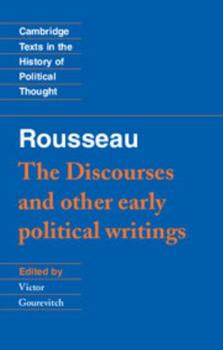Rousseau: 'the Discourses' and Other Early Political Writings
Select Format
Select Condition 
Book Overview
A comprehensive and authoritative anthology of Rousseau's important early political writings in faithful English translations. This volume includes the Discourse on the Sciences and Arts and the... This description may be from another edition of this product.
Format:Paperback
Language:English
ISBN:0521424453
ISBN13:9780521424455
Release Date:July 1997
Publisher:Cambridge University Press
Length:485 Pages
Weight:1.47 lbs.
Dimensions:1.1" x 5.5" x 8.4"
Customer Reviews
2 ratings
Review of Cambridge's Rousseau, Volume One
Published by Thriftbooks.com User , 14 years ago
This is a solid translation. It contains the two critical dialogues of Rousseau's early career, as well as other minor works that reveal more corner of Rousseau's ever-interesting imagination. Furthermore, the work is supplemented by a great introduction, both on the themes of the work and on its terminology. Indeed, the volume contains a sort of glossary before the translations, speaking to each of the most important words within these works. One complaint: I don't like the physical, material aspect of this translation (or Cambridge in general). These sharp blue books have a tough and unyielding 'soft'cover, which really makes holding the book open difficult.
Essay, The Chain of Free Will
Published by Thriftbooks.com User , 19 years ago
B1 refers to the 'the Discourses', B2 refers to the "Social Contract" by Rousseau "Man are born free, but everywhere they are in chains." What a glorious line! Who would not want to shake off the chains and be free? The question is, what kinds of freedom is Rousseau talking about, and where is the source of the evil chain? Rousseau talks about two kinds of freedom, the freedom to act and the freedom to enjoy the fruits of action, both of which serve the goal of the preservation of life. The freedom to act is called "free will"; it differentiates men from animals and is directed by one's desires. In the state of nature, the "free will" of men allows them to find creative sources of subsistence as the environment changes, and each is free to enjoy the fruits of their labor because he has labored independently. In civil society, however, men must labor together and share their produces. Under these new conditions, "free will" will lead men to excessive desire which result in the usurpation of the others' freedom to enjoy the fruits of their labor. The loss of the freedom to enjoy puts the life of every member of the society under danger, and hence, in the civil society, "free will" has contributed negatively to its goal of the preservation of life. The chain of life, therefore, is in fact "free will", which was beneficial for the preservation of life in the state of nature, but detrimental to this goal in the civil society. Hence, for the civil society to achieve its end of preserving life, each individual must give up their "free will" and succumb their freedom to act to the general will of the society. Survival-the Goal of Life Rousseau frequently repeats that preservation of life is the most fundamental goal of man's actions. He writes, "Man's first sentiment was that of his existence, his first care is that for his preservation." (B1, p161) And, "His (man's) first law is to attend to his own preservation, his first cares are those he owes himself..." (B2, p42) As the first "care" and "law" of life, and the "first sentiment", the desire for survival is the singular progenitor to all other desires in life, and in the state of nature, will always trump all other interests in life. One might say that there are higher goals in life beyond mere survival. Indeed there are, however, if one does not survive, those higher goals of life could not exist either. The mechanism by which men strive for survival is to act according their "free will". Rousseau writes, "I see in animal nothing but an ingenious machine to which nature has given senses in order to wind itself up and, to a point, protect itself against everything that tends to destroy or to disturb it. I perceive precisely the same thing in the human machine, with this difference that Nature alone does everything in the operations of the Beast, whereas man contributes to his operations in his capacity as a free agent..." (B1, p140) Here, Rousseau again emphasizes that the "inge






